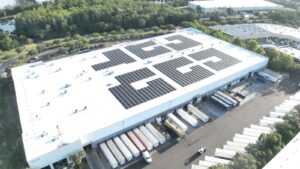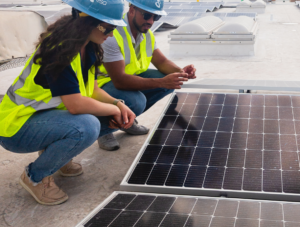Introduction:
In the fight against climate change, solar energy has emerged as a key player in reducing greenhouse gas emissions and creating a sustainable future.
As businesses strive to adopt renewable energy practices, certain companies have taken the lead in investing and embracing solar energy.
By showcasing their efforts, we hope to inspire other organizations to follow suit and contribute to a greener, more sustainable workplace.
Amazon:
Amazon, as the world’s largest corporate purchaser of renewable energy, is leading the charge in transitioning to clean energy and driving down emissions.
They have set an ambitious goal of powering their operations with 100% renewable energy by 2025, surpassing their initial target by five years.
In 2021, Amazon achieved an impressive milestone of reaching 85% renewable energy across their business and announced renewable energy projects in 18 countries.
Their efforts include the launch of solar projects in South Africa and the United Arab Emirates, as well as new projects in Singapore, Japan, Australia, and China.
Amazon has made a dedicated effort to reduce carbon emissions in its delivery fleet by introducing over 5,000 specially designed electric delivery vans throughout the United States.
In the United States, Rivian’s vans, used by Amazon, have successfully transported over 150 million packages to customers.
Through their global investments in renewable energy, Amazon is actively decarbonizing their operations and serving as a shining example for sustainable practices.

META Platforms, Inc.:
META Platforms, Inc. is a prominent corporate buyer of renewable energy, actively leading the transition to clean energy in its communities by selecting projects connected to its data centers’ electricity grids.
With contracts in place for over 9,000 megawatts (MW) of solar and wind energy worldwide, including more than 5,500 MW of new renewable energy already in operation, META is making a significant impact.
By integrating energy storage into the grid, they’re reducing carbon emissions and enabling the seamless integration of renewable energy.
Due to the rise of remote work and the expansion of cloud-based technologies, the demand for data centers has experienced a significant surge in recent years.
This growth means additional structures, land, cooling systems, and electricity to sustain the continuous operation of the physical buildings.
The need for data centers will only intensify with further technological advancements meaning that society is still in the early stages of this development.
Solar power systems can provide a data center with a way to offset operational costs and reduce environmental impacts.
META has added 50 MW of battery storage alongside 240 MW of solar energy near its Los Lunas data center, showcasing their commitment to sustainable practices.
With a total of 130 MW of battery energy storage deployed in New Mexico, Kentucky, and Mississippi, they remain dedicated to driving the transition to renewable energy for a greener future.

Apple:
Apple has made significant strides in their Supplier Clean Energy Program, with over 40 manufacturing partners joining in the past year to support the decarbonization of Apple-related operations and the sourcing of 100% renewable electricity.
Through the program, Apple collaborates closely with suppliers, offering resources and training through their Clean Energy Academy to help them achieve their renewable energy commitments.
The remarkable progress towards their 2030 carbon neutrality goal demonstrates Apple’s global efforts to drive innovation and resilience.
With a total of 13.7 gigawatts of operational renewable energy across their global supply chain, Apple and their suppliers collectively avoided 17.4 million metric tons of carbon emissions in 2021, equivalent to removing nearly 3.8 million cars from the road.
Apple also powers all corporate offices, data centers, and retail stores with approximately 1.5 gigawatts of renewable electricity across 44 countries, while investing in solar projects to address supply chain emissions.
The Supplier Clean Energy Program has enabled significant progress among U.S. manufacturing partners, with 27 U.S. suppliers achieving 100% renewable electricity.
The program has facilitated joint investments in over 650 megawatts of renewable electricity capacity, emphasizing Apple’s commitment to driving scalable action and promoting a sustainable future.
Walmart:
Kathleen McLaughlin, Chief Sustainability Officer of Walmart Inc., expressed the company’s ongoing commitment to climate action, highlighting their goal of achieving 100% renewable energy globally by 2035.
Ms. McLaughlin emphasized the importance of collective action in reducing greenhouse gas emissions and mitigating the impacts of climate change.
She commended the growing number of companies embracing solar energy and taking steps towards a renewable future.
In alignment with their sustainability objectives, Walmart also unveiled plans to power its facilities worldwide using 100% renewable energy by 2035, while targeting zero emissions across its global operations by 2040.
Providing perspective on their solar initiatives, it is noteworthy that each week over 7.2 million people, equivalent to 2.2% of the U.S. population, shop at a Walmart store with a solar installation, exemplifying the scale and impact of their renewable energy efforts.
Microsoft:
A global leader in the solar industry has partnered with Microsoft Corp., to help the technology company in achieving carbon negativity by 2030. Microsoft wants to establish a strong supply chain for new renewable electricity capacity.
This collaboration aims to meet the demand for over 2.5 gigawatts of solar panels and related services, which can power more than 400,000 homes.
Microsoft, in its pursuit of sourcing 100% renewable energy to cover its electricity consumption by 2025, supports domestic production of green energy equipment and endorses solar solutions.
This partnership marks a significant step in diversifying the global energy supply chain, driving the development of reliable and sustainable energy networks, and reducing carbon emissions.
By working together, these companies exemplify the importance of collective efforts to deliver a cleaner, greener future and combat climate change on a global scale.
Target:
Target demonstrates its commitment to sustainability and community support by embracing renewable energy solutions and striving for net zero greenhouse gas emissions.
With a focus on energy-efficient and sustainable buildings, Target achieved its goal of equipping 500 locations with rooftop solar panels by 2020.
Now, the company aims to source 100% of its electricity from renewable sources for its U.S. stores and distribution centers.
Target stores utilizing solar power generate between 15% and 60% of their electricity from solar energy.
Additionally, through new contracts with solar projects, Target is poised to meet over 50% of its electricity needs with renewable energy sources.
These endeavors underline Target’s commitment to renewable energy and their ongoing efforts to expand their portfolio of offsite solar, ensuring the realization of their sustainability goals.
Conclusion:
The top 6 companies investing in solar energy – META Platforms, Amazon, Apple, Walmart, Microsoft, and Target – are pioneers in adopting renewable energy practices.
Their commitment to solar power installations, greenhouse gas reduction goals, and carbon neutrality is not only commendable but also essential for a sustainable future.
We encourage other companies to prioritize and invest in solar energy, fostering a greener and more sustainable environment for generations to come.
Together, we can lead the way toward a brighter future.

Commercial Solar For Small/Medium Businesses:
Achieving sustainability in the workplace is a challenge for the majority of businesses.
Unlike large corporations, small and medium-sized businesses often lack the necessary resources, expertise, and financial capabilities to thoroughly evaluate the potential benefits of solar applications.
Factors such as limited budgets, lack of in-house technical knowledge, and the absence of dedicated sustainability departments make it difficult for these businesses to navigate the complexities of solar investment.
In contrast, for large companies, evaluating and implementing solar power systems is typically less of a challenge.
These huge corporations often possess the financial means to become a sustainable business, along with access to specialized teams or consultants who can analyze the potential return on investment and assess the technical requirements.
Larger organizations may have sustainability initiatives in place, with dedicated departments focused on exploring renewable energy options and managing the process effectively.
The resources and capabilities available to these companies streamline the evaluation process and facilitate the adoption of solar energy.











